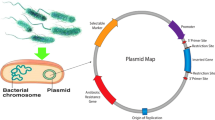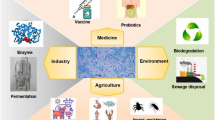Abstract
To study the influence of the htpG gene on thermal stress management in Bacillus subtilis, two different kinds of htpG mutation were constructed. In one case, the gene was inactivated by insertion of a cat cassette in to the coding region; htpG was thus found to be non-essential. In the second case, the htpG gene was fused to a xylose-dependent promoter, allowing expression of the gene to be controlled. In the absence of HtpG protein, recovery of cells from a heat shock at 53° C was retarded, and this delay could be eliminated by overproduction of HtpG. While htpG is not involved in the development of induced thermotolerance, DnaK and GroE proteins are absolutely required. Overproduction of class I heat-shock proteins prior to shifting cells to a lethal temperature is important but not sufficient for the development of intrinsic thermotolerance. It could be shown that the HtpG protein does not act as a cellular thermometer in B. subtilis.
Similar content being viewed by others
Author information
Authors and Affiliations
Additional information
Received: 2 December 1998 / Accepted: 28 January 1999
Rights and permissions
About this article
Cite this article
Versteeg, S., Mogk, A. & Schumann, W. The Bacillus subtilis htpG gene is not involved in thermal stress management. Mol Gen Genet 261, 582–588 (1999). https://doi.org/10.1007/s004380051004
Issue Date:
DOI: https://doi.org/10.1007/s004380051004




